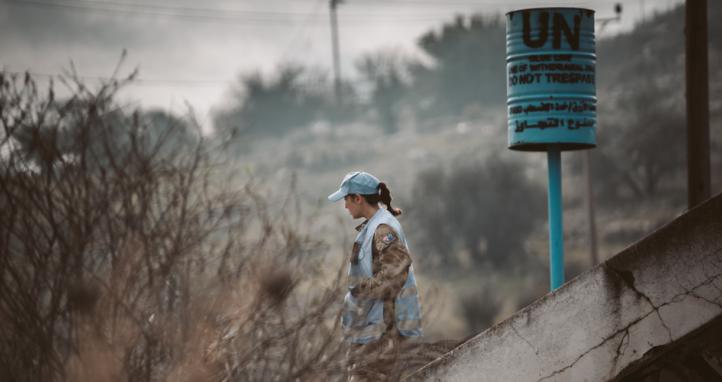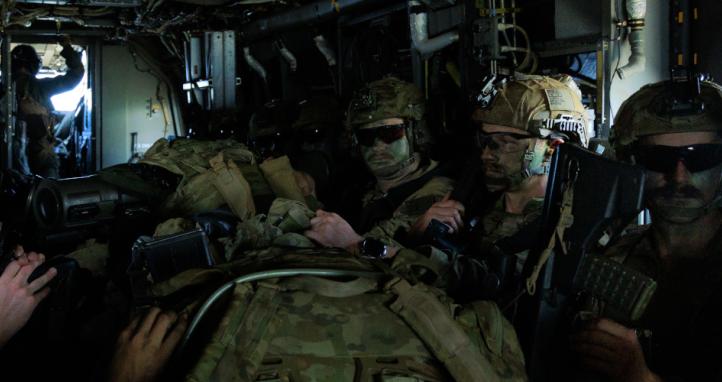This article was a submission to the 2022 Cove Competition.
Understanding my role as the Operations Warrant Officer (OPSWO) of the 1st Battalion, The Royal Australian Regiment is something that raised a number of questions and uncertainties in my mind. For a long time, I have observed knowledgeable and experienced soldiers fulfil this role. In conducting my duties as the OPSWO, I found it was not necessarily the knowledge of the person in the role that made the team successful, but the bringing together of the knowledge found within the team’s subject matter experts. In this paper, I will provide my lessons learned in fulfilling the role of OPSWO both in training and on deployment.
Guiding the team
A solid observation during this year was the passion and desire to contribute shown by captains and sergeants fulfilling their role as part of the operations team. General Powell once said:
“You don’t step on enthusiasm”
Often seen to be putting aside their own interests to achieve the mission and the desired outcome, it was clear that there was an established appreciation for people’s strengths. As OPSWO, the best way I saw my ability to contribute was to productively encourage and guide members to realistic outcomes. Some sound advice given by the Regimental Sergeant Major:
“Planning is what captains are employed to do, stand back and observe. If you see a risk, provide some guidance, otherwise take a step back and assist when asked”
The lesson: By providing possible answers early to tactical problems I had experienced, I would be taking away from a valuable planning process of them arriving at their own workable solutions. As OPSWO, I was to make myself available to bounce ideas off, while highlighting possible risks and/ or working through different courses of action. My takeaway is to be in the background, observe, analyse, evaluate, assess, and guide.
Sharing your thoughts
“Know when to Shut the F#*k up” – Command Sergeant Major Gabriel Arnold (Ret)
Adding up the time I have spent in the organisation, my reputation, my position as OPSWO, and my competence in planning; I learned early on to be aware of the right time to speak up, and the right time to shut the F#*k up. Having a great working relationship with my operations officer (OPSO) saved me on more than one occasion when my opinion (normally through frustration) was tolerated rather than valued. Although I saw perceived value in what I was saying in a general forum, it could be seen as detrimental when delivered to a wider audience and could have waited to be discussed behind closed doors.
The lesson: Be disciplined on where, when, and to who you offer your ideas and opinions. A strong working relationship is a must between the OPSWO and OPSO and being able to offer frank, honest, and direct thoughts without fear of repercussions.
Basic rules can serve as indicators
“No eating in the JOR” – ADJT, 1 RAR
What does not eating in the JOR have to do with anything? Such a small rule that was introduced early to the Ops team set the standard for discipline that paid out tenfold in the long term. Operational team members often push the limits of ‘hours without sleep’. Sneaking a snack in the JOR serves as an excellent combat indicator to when people have hit their limit of productivity. It sounds ridiculous, but it works. When this simple rule is broken, it is a clear indicator that a member of the team is no longer productive and is not thinking clearly.
The lesson: I observed that almost every officer is out to plan for as long as they can (not considering when to sleep). Having basic rules to provide a combat indicator allowed for maintenance of manpower on exercise and deployment. Although it may sound like I was micro-managing officers, the words “Go to bed Sir/Ma’am” are respected and understood by all staff officers when spoken by the OPSWO.
Appreciate and learn how things happen
“Logistics just happens” – Every infantryman ever
Like every infantryman ever, I have long subscribed to the throwaway line that ‘log just happens’. I completed my platoon sergeant and company sergeant major time thinking what more is there to know apart from ‘1, 3 and 5 will keep me alive’. Having my requests always show up throughout my career sheltered me from the knowledge of the staff hours and involvement of outside organisations it actually takes to facilitate simple things such as water, rations, and ammunition. However, this was just scratching the surface and the world of logistics, maintenance and administration introduced itself by slapping me hard in the face.
The lesson: Logistics, maintenance and administration staff are the most overworked and underappreciated members within a battalion. I mentioned my observations to a mentor in April on how hard our logistics, maintenance and administration staff had been working to facilitate our operations and training. He mentioned the below quote which made me appreciate the wheelhouse positions that enable the battalion’s capability:
“Some people want things to happen, some wish it to happen, others make it happen” – Michael Jordan
The message I took was that logistics, maintenance and administration staff will do whatever it takes to enable the soldiers of the battalion. Make yourself available to assist where you can. This may be in the form of something as simple as sending an email. You add to their ability to facilitate by doing the small things.
Learning from failure
“Sheltering people from natural consequences teaches irresponsibility” – Stephen R. Covey
Holding a position that allowed me to track the battalion’s planning, ranges, exercises and operations was excellent for being ‘all-informed’ and being able to ‘go in to bat’ for people when they needed resources, range space and equipment for training. However, an observation throughout the year was of callsigns planning and committing to more than what could reasonably be expected. While there was always a desire to step in and solve these oversights and problems, one of the best pieces of advice I received was to not shelter people from a learning opportunity. It could encourage them to make the same mistake again in the future.
The lesson: Consequences and lessons learned often have more value than a satisfactory completion of a task. A quote provided during one of our PME sessions in July was:
“Failure is a prerequisite for great success. If you want to succeed faster, double your rate of failure” – Brian Tracy
Allow people to use failure as a learning opportunity, but do not tolerate it as an excuse.
Is the base standard good enough?
“Meh, Good enough” – Mediocraties
I discuss training with CSMs, and the process in which the Ops team plans to achieve the end state base level standard that is required to achieve an acceptable outcome. A meme shown to me stated:
“Most people just want to be in the result and not part of the process, and it’s in the process that you realise who deserves to be in the result” – Unknown
The lesson: Everyone has the ability to achieve a base level standard which can be seen as ‘good enough’ by the chain of command. But if you have the ability to fill the process with training that builds resilience through hardship, then we have the responsibility to do so. If we invest in today’s training audience, it will pay off in the future fighting force.
“The return of investment is not today, it’s not tomorrow – It’s when we are getting our face shot off that we will see the return” – LT COL H. Smith
You are surrounded by subject matter experts. Use them!
The famous one liner ‘No cuff too tuff’ could get you in trouble quick if you were to practice it as the OPSWO. The fact is you don’t need to cuff anything. You are surrounded by subject matter experts that know elements of planning better than you do. This includes knowledge shared with the CSMs. I found being humble in asking for help on the simplest tasks empowered the collective Ops team and WO2 rank structure.
The lesson: If you are not asking dumb questions of each other (as both a CSM and OPSWO), then you rob yourself of the opportunity of achieving great training results for your team. Albert Einstein said “I don’t need to know everything, I just need to know where to find it, when I need it”. Communicate early and often with each other, understand the risk together and achieve as a team.
So what is it that you actually do here?
An honest response to this question is that I don’t have a ‘to the point’ answer. Of course, I could list my agreed responsibilities and provide a detailed rundown of my calendar bookings, but that would not portray the role accurately. Building and maintaining habitual relationships, communication with all involved, and providing common sense to other people’s knowledge is the best way I could think to describe the role of the OPSWO.









